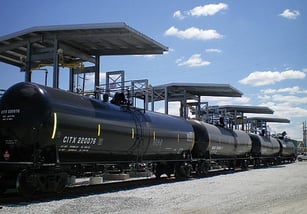 Unit trains, which are common in the crude oil market, consist of 60 or more tank cars carrying the same commodity to a single destination. Tank car design, along with loading and unloading processes, significantly impact rail safety and efficiency.
Unit trains, which are common in the crude oil market, consist of 60 or more tank cars carrying the same commodity to a single destination. Tank car design, along with loading and unloading processes, significantly impact rail safety and efficiency.Before crude oil unit trains, most companies left their cars uncoupled. Now, with unit trains having cars of varying lengths and platform configurations, you must take into account rail safety equipment, spotting and loading/unloading procedures.
Since unit trains are almost always left coupled, you should take rail safety considerations into account to allow flexibility when positioning the gangways. It’s important to slow down, check your work and take the time to understand your rail site. Working too quickly may result in injuries or death.
Why Uncoupling Is Not Ideal
When it comes to rail cars, uncoupling is ideal in most situations due to the variations encountered during spotting.
However, with unit trains, uncoupling is not recommended. Uncoupling unit trains takes significantly more time and costs more money in the long run. It also has the potential to decrease throughput and production efficiency.
If needed, the string of rail cars may be divided into two or more strings to allow for positioning on both sides of the loading/unloading rack(s). This practice minimizes piping requirements, (un)loading equipment, and how far the gangways/fall protection equipment must be moved. Knowing how to spot a string of cars is also very important in this process.
The Importance Of Rail Car Spotting
Here are some important factors to consider:
- Easy access to the rail car without having to climb over a railing
- Location of where you will be loading or unloading
- Opening the dome or hatch on the rail car
- Interaction with your loading apparatus, such as a hose or loading arm
While the initial costs may be higher to couple your unit trains, the cost of uncoupling and recoupling cars is significantly higher in the long run and slows down your operation.
If you’re still unsure how to best handle your unit trains, work with your rail safety equipment provider. Your vendor can help you assess your facility and determine the best option for your business.
Learn more about fall prevention strategies and improving rail safety by watching this free webinar from Carbis Solutions.




